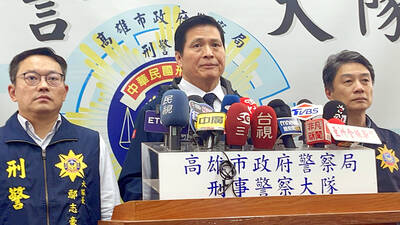The Presidential Office vowed yesterday to continue to push cross-strait reconciliation and a “diplomatic truce” with Beijing, despite China’s opposition to the country’s UN bid.
Presidential Office spokesman Wang Yu-chih (王郁琦) said that the basic rights of the 23 million people of Taiwan who want to participate in international organizations and activities should be respected.
“It would help establish mutual trust, lower the chance of misunderstanding and prevent conflicts if both sides of the Taiwan Strait could jointly participate in international activities,” he said. “It will only help strengthen the peaceful development of both sides if our country could participate in international activities.”
Wang’s comment came in response to Beijing’s objection to Taiwan’s latest UN bid, when Chinese Ambassador to the UN Wang Guangya (王光亞) said Taiwan was not qualified to participate in the specialized organizations of UN.
Wang Yu-chih said that Wang Guangya’s comments were “expected” and the government would continue to push cross-strait reconciliation and a “diplomatic truce” with Beijing.
When asked by the Taipei Times what the administration would do if Beijing did not respond positively to Taiwan’s goodwill, Wang Yu-chih said Beijing had extended a lot of goodwill since Ma took office and the public should not interpret Wang’s comments as “ill will.”
“I would call it an isolated case that occurred as we push the policy of cross-strait reconciliation and a diplomatic truce,” the spokesman said, adding that similar situations occurred during the Boao Forum and the controversy surrounding Beijing’s reference to the country’s Olympic team.
He said the administration would continue to try to participate in international activities as long as such efforts did not violate the result of the two referendums held in tandem with the presidential election in March.
The Democratic Progressive Party (DPP) referendum proposed “joining” the UN under the name “Taiwan,” while the Chinese Nationalist Party’s (KMT) referendum suggested “rejoining” the UN under the name the “Republic of China.” Both referendums failed and the proposals cannot be put to a vote again for three years, according to the Referendum Law (公投法).
Wang Yu-chih said that all government policies, including foreign policy, were made according to the principles that Taiwan is put first and the people will benefit.
The strategy of the former DPP administration had proved ineffective, he said, and only if both sides extend goodwill to each other could Taiwan get somewhere in the international arena.
Meanwhile, Mainland Affairs Council (MAC) Vice Chairman Liu Teh-hsun (劉德勳) urged Beijing to take the wishes of the Taiwanese people to participate in international organizations seriously.
“The people of Taiwan have always wanted to expand their nation’s participation in international organizations with dignity,” Liu said. “We hope Beijing will pay attention to the political reality in the Taiwan Strait and change the approach it has adopted.”
If both sides of the Taiwan Strait could jointly participate in international organizations, Liu said, it would help establish mutual trust, smooth away differences, reduce unnecessary misunderstandings and prevent conflicts.
Liu urged both sides to negotiate on the principle of “mutual non-denial” and seek a balance for a win-win situation. He also called on both sides to engage in mutual assistance, cooperation and respect so they could contribute more to the international community and cross-strait development could march toward peace and prosperity.
In related news, the Ministry of Foreign Affairs rebuffed criticism that it had been “too weak” in responding to Beijing’s rejection of this year’s UN bid, saying the “diplomatic truce” proposed by President Ma Ying-jeou (馬英九) only pertains to the long standing tug-of-war with Beijing for allies.
Taiwan will never give up the fight for increased participation in international organizations, it said.
“We have always said that diplomatic truce means neither Taiwan nor China will steal away each other’s allies based on the mutual goodwill. But the government will never relax its efforts for more participation in international organizations,” ministry spokesman Henry Chen (陳銘政) said.
Last Monday, in a letter to the UN Secretariat, Beijing criticized Taiwan’s UN bid, saying the “Taiwan region” was not eligible to participate in the activities of specialized agencies under the global body because it was not a sovereign state.
This year, instead of seeking to become a member of the UN, the Ma administration decided to ask only for “meaningful participation” in the activities of UN auxiliary organizations.
On Wednesday the ministry said Beijing’s objection to the bid was “predictable.”
“We are not surprised that Beijing retained its usual stance, but unlike before, Beijing said the issue of Taiwan’s international space could be resolved through consultation,” Chen said.
However, he was reluctant to interpret Beijing’s offer to negotiate as an olive branch or a gesture of goodwill.
Some critics have called the ministry “weak” and “too soft” for not chastising Beijing over its claim that Taiwan is part of China in its official statement on Wednesday.
Chen said the ministry was being “pragmatic” in its long-term pursuit of increased international space.
Approached by reporters in the legislature yesterday, KMT Legislator Lin Yu-fang (林郁方), head of the Diplomacy and National Defense Committee, said China’s letter meant that both sides of the Strait were still testing each other’s bottom line.
“In the international arena, we should fight the fight when necessary,” he said.
He said Taiwan and China might work on negotiating a model similar to that of the APEC for Taiwan to gain participation in UN affiliated organizations, but he said Taiwan should never give up fighting for the rights it deserves.
ADDITIONAL REPORTING BY FLORA WANG

Twenty-four Republican members of the US House of Representatives yesterday introduced a concurrent resolution calling on the US government to abolish the “one China” policy and restore formal diplomatic relations with Taiwan. Led by US representatives Tom Tiffany and Scott Perry, the resolution calls for not only re-establishing formal relations, but also urges the US Trade Representative to negotiate a free-trade agreement (FTA) with Taiwan and for US officials to advocate for Taiwan’s full membership in the UN and other international organizations. In a news release announcing the resolution, Tiffany, who represents a Wisconsin district, called the “one China” policy “outdated, counterproductive

Actress Barbie Hsu (徐熙媛) has “returned home” to Taiwan, and there are no plans to hold a funeral for the TV star who died in Japan from influenza- induced pneumonia, her family said in a statement Wednesday night. The statement was released after local media outlets reported that Barbie Hsu’s ashes were brought back Taiwan on board a private jet, which arrived at Taipei Songshan Airport around 3 p.m. on Wednesday. To the reporters waiting at the airport, the statement issued by the family read “[we] appreciate friends working in the media for waiting in the cold weather.” “She has safely returned home.

ON PAROLE: The 73-year-old suspect has a criminal record of rape committed when he was serving in the military, as well as robbery and theft, police said The Kaohsiung District Court yesterday approved the detention of a 73-year-old man for allegedly murdering three women. The suspect, surnamed Chang (張), was arrested on Wednesday evening in connection with the death of a 71-year-old woman surnamed Chao (趙). The Kaohsiung City Police Department yesterday also unveiled the identities of two other possible victims in the serial killing case, a 75-year-old woman surnamed Huang (黃), the suspect’s sister-in-law, and a 75-year-old woman surnamed Chang (張), who is not related to the suspect. The case came to light when Chao disappeared after taking the suspect back to his residence on Sunday. Police, upon reviewing CCTV

TRUMP ERA: The change has sparked speculation on whether it was related to the new US president’s plan to dismiss more than 1,000 Joe Biden-era appointees The US government has declined to comment on a post that indicated the departure of Laura Rosenberger as chair of the American Institute in Taiwan (AIT). Neither the US Department of State nor the AIT has responded to the Central News Agency’s questions on the matter, after Rosenberger was listed as a former chair on the AIT’s official Web site, with her tenure marked as 2023 to this year. US officials have said previously that they usually do not comment on personnel changes within the government. Rosenberger was appointed head of the AIT in 2023, during the administration of former US president Joe